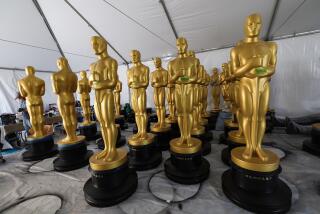Hollywood Film Awards and dubious history land in prime time

- Share via
Two years ago, Quentin Tarantino sheepishly walked onto the stage of the Beverly Hilton Hotel’s ballroom to collect a Hollywood Film Awards screenplay prize for his gonzo western “Django Unchained.”
The movie wouldn’t arrive in theaters for nine more weeks.
“It’s strange to get an award while I’m still in the editing room,” Tarantino said. Even so, he thought that the honor could prove helpful in winning arguments with his editor. “I’ll be able to say, ‘Hey, you want to take a line out of my award-winning screenplay?’ ”
The Hollywood Film Awards have long enjoyed a wink-wink relationship with movie studios and A-list talent. Honors have often been given to movies sight-unseen. And the selection process could be charitably described as “vague,” with the primary criteria being the winners’ promise to attend the ceremony.
But now the glitzy event, started in 1997 by Mozambique-born entrepreneur Carlos de Abreu and his wife, former “The Price Is Right” model Janice Pennington, is preparing for a very public coming-out party. CBS has set aside 31/2 hours to air the show in prime time Friday, marking the ceremony’s television debut.
“We’re designing this as the ‘greatest-kept secret in Hollywood,’” CBS Executive Vice President Jack Sussman said of the ceremony, which will be attended by the likes of Angelina Jolie, Benedict Cumberbatch and Robert Downey Jr. “We believe in this franchise.”
The network isn’t alone. Dick Clark Productions, which presents several awards shows, including the Golden Globes and the American Music Awards, invested in De Abreu’s franchise two years ago with an eye toward staging a network television event.
With CBS and Dick Clark behind them, the Hollywood Film Awards are attempting to follow the status trajectory of the Globes, the Hollywood Foreign Press Assn. event that has moved from punchline to prominence, helped along by the rise of celebrity culture and the support of studios and talent looking for a red-carpet photo opportunity to promote their awards-season fare.
The Hollywood Film Awards’ mission, as set forth by De Abreu, can be best understood by its trademarked slogan: the Official Launch of the Award Season.
Up until this year, the event was held in October. CBS pushed it to November, Sussman said, so the viewing audience would be more familiar with the movies being honored, many of which haven’t been seen outside the festival circuit. Placing it in the November TV sweeps period was also a factor, he added.
But the process behind choosing the show’s award winners hasn’t changed. De Abreu and his invited, unnamed, 12-member selection team make the choices, Dick Clark Productions programming executive Mark Bracco said. The names of the selection committee remain confidential, Bracco added, so “studios won’t lobby them for votes.”
Awards-season consultants and high-level studio publicists offer a different take, saying De Abreu has always called the shots. “It’s just Carlos ... and maybe his wife,” said one Oscar consultant, who like others interviewed for this story, requested anonymity to protect his clients from fallout. (De Abreu would not comment for this story.)
The lack of clarity in voting could lead to a problem greater than lack of credibility. NBC took the Golden Globes off the air for several years after the FCC admonished the network in 1968, saying the show misled the public by claiming the winners were determined by a poll when, in fact, the agency said, studio lobbying determined the results.
“Awards are only as interesting as the people who give them, and only as legitimate as the process is transparent,” said Mark Harris, who covers the awards season for Grantland. “The Hollywood Film Awards fail on both counts. When you don’t know who’s doing the judging or how the winners are arrived at, that probably means that what you’re hearing about isn’t an award, but the result of a negotiation between a movie’s publicity team and an organization that’s looking to draw stars to sustain itself.”
Adds a veteran Oscar consultant who regularly dines with De Abreu: “It can’t be a show going forward without some checks and balances. They have to play it straight in terms of accountability.”
CBS’ Sussman says the lack of transparency would be a “concern” if the Hollywood Film Awards’ choices departed significantly from the conventional wisdom, using the oft-cited scandal surrounding the Hollywood foreign press giving Pia Zadora a Golden Globe in 1982 as an example of a left-field choice. “Ninety-percent-plus of the Hollywood Film Awards winners have gone on to receive Oscar nominations,” Sussman noted.
The show isn’t stingy in its largesse. Eighteen honors will be handed out over the course of a two-hour telecast. (CBS will also air a 30-minute arrivals pre-show and an hour-long program of pre-taped and live interviews after the ceremony.) The network presence will put the event on a clock for the first time, restricting what has been in the past a loose, rambling and occasionally unguarded evening. Presenters, usually someone connected to the winner, will have roughly a minute to offer an introduction. Acceptance speeches will be limited to 90 seconds to 2 minutes, Bracco said, depending on the award.
“We’ve been upfront with everyone this year,” Bracco said. “This is a TV show. We have to keep things moving.”
That rigidity will likely streamline the number of effusive expressions of thanks to various “teams” but also rob the evening of some spontaneity. Two years ago, filmmaker Judd Apatow, accepting the Hollywood Comedy Award, riffed for five minutes, offering ideas on how to improve the ceremony, using notes he had scribbled on the back of his program. Among them: “Please tell the kid [Quvenzhané Wallis] from ‘Beasts of the Southern Wild’ not to mention God. This is Hollywood.” And: “Please add commercial breaks so we can all pee, smoke and talk.”
Apatow’s wish has now been granted. After his biting remarks, however, it’s anyone’s guess as to whether he’ll be invited back anytime soon.
Follow me on Twitter: @GlennWhipp
More to Read
Only good movies
Get the Indie Focus newsletter, Mark Olsen's weekly guide to the world of cinema.
You may occasionally receive promotional content from the Los Angeles Times.










